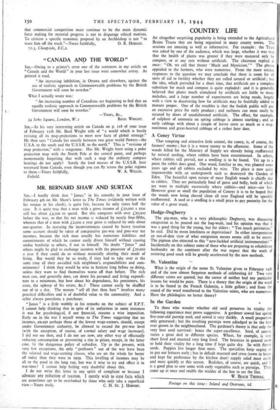MR. BERNARD SHAW AND SURTAX siR,—I hardly think that "Janus,"
in his remarks in your issue of February 4th on Mr. Shaw's letter to The Times (evidently written with his tongue in his cheek), is quite fair, because he only states half the case. It is quite true that a man with a gross income of £5o,000 a year still has about £4,500 to spend. But this compares with over £20,000 before the war, so that his net income is reduced by nearly four-fifths, whereas that of a man with £2,000 a year gross- is reduced by only about one-quarter. In assessing the inconveniences caused by heavy taxation some account should be taken of comparative pre-war and post-war net incomes, because the rich man usually has numerous liabilities and commitments of which he cannot easily divest himself without causing undue hards'nip to others, if not to himself. No doubt " Janus " and others might be glad to exchange incomes with the possessor of £20,000 a year if they could do so without materially altering their mode of living. But would they be so ready, if they had to take over at the same time all their so-called rich neighbour's responsibilities and com- mitments? I think they would be wise to hesitate long before so doing, unless they want to find themselves worse off than before. The rich man can, and generally does, cut down his personal and living expendi- ture to a minimum, but how about his dependants, his pensioners, his rates, the upkeep of his estate, &c.? These cannot easily be shuffled out of-in a day. The maxim " sell all that thou hast " involves many practical difficulties and is of doubtful value to the community. And a seller always postulates a purchaser.
" Janus " is a little wobbly in his remarks on the subject of E.P.T. I cannot help thinking that in spite of its unfairness in some instances it was for psychological, if not fmancial, reasons a wise imposition. Early on in the war I myself wrote to The Times suggesting that no incomes, except perhaps those of the lowest wage-earners, should, except under Government authority, be allowed to exceed the pre-war level (with the exception, of course, of Lormal salary and wage increases). I did not see then, and I do not see now, any other way of effectually reducing consumption or preventing a rise in prices, except, in the latter case, by the dangerous policy of subsidies. Up to the present, with very few exceptions, the only "profiteers" out of the war have been the salaried and wage-earning classes, who are on the whole far better off today than they were in 1939. This levelling of incomes may be all to the good in the long run, but was it wise to try and effect it in war-time? I cannot help feeling very doubtful about this.
I do not write this letter in any spirit of complaint or because I advocate any reduction of taxation. I merely wish to state facts which are sometimes apt to be overlooked by those who only take a superficial


























 Previous page
Previous page